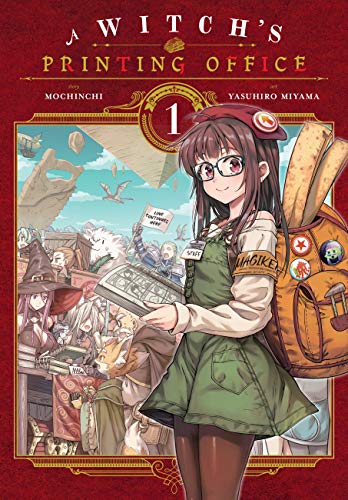By Mochinchi and Yasuhiro Miyama. Released in Japan as “Mahoutsukai no Insatsujo” by Kadokawa Shoten, serialization ongoing in the magazine Dengeki G’s. Released in North America by Yen Press. Translated by Amber Tamosaitis.
It’s become something of a running gag that “isekai” is the way to sell your title to a publisher, no matter what the series is. “I’ve got this idea about two philosophy students meeting in a coffee shop to discuss Kokugaku and Rangaku.” “…why would that ever sell?” “You see, the coffee shop is… IN ANOTHER WORLD!” That said, sometimes the isekai prototype does help to make a series more interesting because it’s baked into the plot, especially when the series can avoid the usual pitfalls of having the same thing happen – no guilds, adventurers, etc. Without its isekai plotline, this would just be one of seventy different kinds of “we’re working in an office and also connected with Comiket” titles that come and go with no one remembering them. But, let’s face it: Recreating Comiket in a fantasy world, using magic tomes as the draw… that’s a very clever idea. And from this idea we get the story of Mika, whose desire to get back home led to all this.
The actual circumstances of Mika ending up in another world are mostly glossed over in this first volume – when we come across her, she’s been in this fantasy world for some time. She has one magical skill, Copy, which is what it sounds – she’s a human copier machine. Trying to find a spell that can transport her back home, she’s created her own printing office to help out people who desperately need things copied, such as the magic spell that can drive away monsters, which with Mika’s help can be given to every villager. That said, magic books and spells don’t just walk up to you, even if you are a printing company. And so Mika has decided to help organize Magiket, a massive convention where people buy and sell magical spells. Can she keep the convention from going off the rails? And can she find a spell that will get her back home?
I will admit, “magical Comiket” is just the sort of high-concept idea I like, so I was already on this manga’s side to begin with. Mika might remind many people of Yomiko from Read or Die, at least in appearance, but she’s also a very can do sort of woman who sometimes exhausts herself trying to achieve something and help others. There’s various subplots at the Magiket itself: some people aren’t selling well, at least not until a spell is urgently needed; some folks are trying to sell illegal or illicit spells; and of course there’s the usual problems with lines and keeping everyone moving. I’m not spoiling anything to say that by the end of this book Mika has not found a way to return home, but she has managed to carve out a niche for herself, starting a company with enthusiastic employees and organizing a massive publishing event. Honestly, she’s achieved more in one book than a lot of isekai slackers have in ten.
I don’t expect too many serious or ongoing plots in this series, which when you boil it down is another workplace slice-of-life. But adding the isekai made all the difference for once, and I look forward to seeing what the next Magiket brings us.
